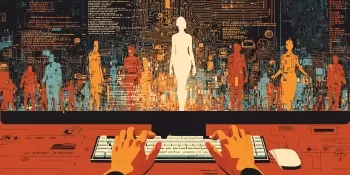AI agents aren't just assistants: How they're changing the future of work today

The AI industry is evolving at breakneck speed, with groundbreaking innovations constantly reshaping its landscape. Among these advancements, AI agents have become a focal point for business leaders, seen as key drivers in accelerating enterprise digital transformation.
During the South by Southwest conference, a panel discussion titled "AI Agents and the Future of Human Collaboration" explored how AI will transform workplace dynamics. Panelists Nickle LaMoreaux, IBM's chief human resources officer, and Hannah Elsakr, founder of Firefly for Enterprise at Adobe, agreed that integrating AI agents could significantly benefit businesses.
What makes AI agents different from AI assistants?
AI agents represent a significant leap from AI assistants, not just responding to prompts but actively making decisions and executing tasks based on their own reasoning and inference. To clarify this, LaMoreaux shared an example involving restaurant reservations. An AI assistant might schedule a dinner and send invitations, but it lacks the ability to adapt based on additional context. In contrast, an AI agent could check your schedule, account for travel time from a 7 p.m. panel, and adjust the reservation to 7:20 p.m. If the first choice is unavailable, it might select a second option, showcasing its capacity to act autonomously.
"This idea of doing things in programmatic ways that can have multiple variations in them, I think, is the difference between assistants and agents," LaMoreaux explained.
What are the benefits of AI agents in your business?
Implementing AI agents in a business can liberate employees from time-consuming administrative tasks, allowing them to focus on more strategic, human-centric activities. LaMoreaux pointed out, "For every minute that someone spends in an HR process... it is a person who is not out meeting with a client, it is a minute you are not building a product, a minute you are not being creative."
Beyond time-saving, AI agents excel in orchestration, seamlessly coordinating various tools to accomplish tasks efficiently. For instance, booking a trip could involve checking your calendar, booking flights and hotels, and sending an out-of-office email—all managed by the AI agent. This orchestration addresses the challenge many employees face with tool overload, as LaMoreaux noted, "What this agent does—this orchestration layer—allows employees and managers to go into one place and interact with all of those underlying tools."
What are the concerns around AI agents?
The rise of generative AI has sparked concerns about job displacement, a fear intensified by AI agents' ability to operate with minimal human intervention. However, AI agents cannot replace all tasks, particularly those requiring human interaction, problem-solving, or creativity. LaMoreaux emphasized that AI might increase the need for human expertise in certain areas, stating, "With AI and generative AI, domain expertise becomes more important, not less important."
Elsakr added that AI models lack the ability to generate ideas independently, underscoring the need for humans to innovate and implement meaningful initiatives. Another concern is the autonomy of AI agents, which could lead to issues like bias or privacy breaches. Yet, these can be mitigated by customizing AI agents to align with a company's specific needs and values, controlling their access and actions.
LaMoreaux highlighted IBM's cautious approach, using AI agents to match candidates to roles rather than for selection, to avoid potential biases and ensure alignment with company culture.
What should businesses do now regarding AI agents?
Despite some hesitation among business leaders, the consensus from the panel was clear: now is the time to embrace AI agents. LaMoreaux warned, "You cannot wait. The only employees that are going to be replaced are the ones that aren't using AI; the only companies that will be are the ones that aren't using AI."
On an individual level, even if organizations are slow to adopt, people should start learning about and experimenting with AI agents. The rapid evolution of AI demands proactive upskilling, as Elsakr put it, "You don't have a choice on this one... you have to lean into this at this point and upskill yourself."
Related article
 Apple's Craig Federighi Admits AI-Powered Siri Had Serious Flaws in Early Stages
Apple Executives Explain Siri Upgrade Delay
During WWDC 2024, Apple originally promised significant Siri enhancements including personalized context awareness and app automation capabilities. However, the company recently confirmed delays in deliver
Apple's Craig Federighi Admits AI-Powered Siri Had Serious Flaws in Early Stages
Apple Executives Explain Siri Upgrade Delay
During WWDC 2024, Apple originally promised significant Siri enhancements including personalized context awareness and app automation capabilities. However, the company recently confirmed delays in deliver
 Master AI Inpainting Techniques: Midjourney Guide for Flawless Image Editing
Discover the transformative capabilities of Midjourney's AI inpainting technology, a revolutionary feature that empowers creators to refine and perfect AI-generated artwork with surgical precision. This definitive guide reveals expert techniques for
Master AI Inpainting Techniques: Midjourney Guide for Flawless Image Editing
Discover the transformative capabilities of Midjourney's AI inpainting technology, a revolutionary feature that empowers creators to refine and perfect AI-generated artwork with surgical precision. This definitive guide reveals expert techniques for
 Manus Debuts 'Wide Research' AI Tool with 100+ Agents for Web Scraping
Chinese AI innovator Manus, which previously gained attention for its pioneering multi-agent orchestration platform catering to both consumers and professional users, has unveiled a groundbreaking application of its technology that challenges convent
Comments (4)
0/200
Manus Debuts 'Wide Research' AI Tool with 100+ Agents for Web Scraping
Chinese AI innovator Manus, which previously gained attention for its pioneering multi-agent orchestration platform catering to both consumers and professional users, has unveiled a groundbreaking application of its technology that challenges convent
Comments (4)
0/200
![JosephScott]() JosephScott
JosephScott
 August 24, 2025 at 11:01:18 AM EDT
August 24, 2025 at 11:01:18 AM EDT
AI agents sound like they're taking over the workplace! It's wild to think how they're not just helpers but game-changers. Makes me wonder if my job will soon have an AI coworker. 😅 Cool stuff, but a bit scary too!


 0
0
![RalphThomas]() RalphThomas
RalphThomas
 August 4, 2025 at 2:48:52 AM EDT
August 4, 2025 at 2:48:52 AM EDT
AI agents sound like they're taking over the workplace! 😮 Super cool how they're speeding up digital transformation, but I wonder if they'll make my coffee runs obsolete too?


 0
0
![AndrewJones]() AndrewJones
AndrewJones
 August 4, 2025 at 2:01:00 AM EDT
August 4, 2025 at 2:01:00 AM EDT
AI agents sound like they're ready to take over the office! It's wild how fast they're changing work—kinda makes me wonder if my coffee runs will be automated soon. 😅 Cool read!


 0
0
![JackCarter]() JackCarter
JackCarter
 July 27, 2025 at 9:19:05 PM EDT
July 27, 2025 at 9:19:05 PM EDT
AI agents sound like game-changers for work, but I'm curious—how do they handle complex decision-making compared to humans? 🤔 Exciting stuff!


 0
0

The AI industry is evolving at breakneck speed, with groundbreaking innovations constantly reshaping its landscape. Among these advancements, AI agents have become a focal point for business leaders, seen as key drivers in accelerating enterprise digital transformation.
During the South by Southwest conference, a panel discussion titled "AI Agents and the Future of Human Collaboration" explored how AI will transform workplace dynamics. Panelists Nickle LaMoreaux, IBM's chief human resources officer, and Hannah Elsakr, founder of Firefly for Enterprise at Adobe, agreed that integrating AI agents could significantly benefit businesses.
What makes AI agents different from AI assistants?
AI agents represent a significant leap from AI assistants, not just responding to prompts but actively making decisions and executing tasks based on their own reasoning and inference. To clarify this, LaMoreaux shared an example involving restaurant reservations. An AI assistant might schedule a dinner and send invitations, but it lacks the ability to adapt based on additional context. In contrast, an AI agent could check your schedule, account for travel time from a 7 p.m. panel, and adjust the reservation to 7:20 p.m. If the first choice is unavailable, it might select a second option, showcasing its capacity to act autonomously.
"This idea of doing things in programmatic ways that can have multiple variations in them, I think, is the difference between assistants and agents," LaMoreaux explained.
What are the benefits of AI agents in your business?
Implementing AI agents in a business can liberate employees from time-consuming administrative tasks, allowing them to focus on more strategic, human-centric activities. LaMoreaux pointed out, "For every minute that someone spends in an HR process... it is a person who is not out meeting with a client, it is a minute you are not building a product, a minute you are not being creative."
Beyond time-saving, AI agents excel in orchestration, seamlessly coordinating various tools to accomplish tasks efficiently. For instance, booking a trip could involve checking your calendar, booking flights and hotels, and sending an out-of-office email—all managed by the AI agent. This orchestration addresses the challenge many employees face with tool overload, as LaMoreaux noted, "What this agent does—this orchestration layer—allows employees and managers to go into one place and interact with all of those underlying tools."
What are the concerns around AI agents?
The rise of generative AI has sparked concerns about job displacement, a fear intensified by AI agents' ability to operate with minimal human intervention. However, AI agents cannot replace all tasks, particularly those requiring human interaction, problem-solving, or creativity. LaMoreaux emphasized that AI might increase the need for human expertise in certain areas, stating, "With AI and generative AI, domain expertise becomes more important, not less important."
Elsakr added that AI models lack the ability to generate ideas independently, underscoring the need for humans to innovate and implement meaningful initiatives. Another concern is the autonomy of AI agents, which could lead to issues like bias or privacy breaches. Yet, these can be mitigated by customizing AI agents to align with a company's specific needs and values, controlling their access and actions.
LaMoreaux highlighted IBM's cautious approach, using AI agents to match candidates to roles rather than for selection, to avoid potential biases and ensure alignment with company culture.
What should businesses do now regarding AI agents?
Despite some hesitation among business leaders, the consensus from the panel was clear: now is the time to embrace AI agents. LaMoreaux warned, "You cannot wait. The only employees that are going to be replaced are the ones that aren't using AI; the only companies that will be are the ones that aren't using AI."
On an individual level, even if organizations are slow to adopt, people should start learning about and experimenting with AI agents. The rapid evolution of AI demands proactive upskilling, as Elsakr put it, "You don't have a choice on this one... you have to lean into this at this point and upskill yourself."
 Apple's Craig Federighi Admits AI-Powered Siri Had Serious Flaws in Early Stages
Apple Executives Explain Siri Upgrade Delay
During WWDC 2024, Apple originally promised significant Siri enhancements including personalized context awareness and app automation capabilities. However, the company recently confirmed delays in deliver
Apple's Craig Federighi Admits AI-Powered Siri Had Serious Flaws in Early Stages
Apple Executives Explain Siri Upgrade Delay
During WWDC 2024, Apple originally promised significant Siri enhancements including personalized context awareness and app automation capabilities. However, the company recently confirmed delays in deliver
 Master AI Inpainting Techniques: Midjourney Guide for Flawless Image Editing
Discover the transformative capabilities of Midjourney's AI inpainting technology, a revolutionary feature that empowers creators to refine and perfect AI-generated artwork with surgical precision. This definitive guide reveals expert techniques for
Master AI Inpainting Techniques: Midjourney Guide for Flawless Image Editing
Discover the transformative capabilities of Midjourney's AI inpainting technology, a revolutionary feature that empowers creators to refine and perfect AI-generated artwork with surgical precision. This definitive guide reveals expert techniques for
 Manus Debuts 'Wide Research' AI Tool with 100+ Agents for Web Scraping
Chinese AI innovator Manus, which previously gained attention for its pioneering multi-agent orchestration platform catering to both consumers and professional users, has unveiled a groundbreaking application of its technology that challenges convent
Manus Debuts 'Wide Research' AI Tool with 100+ Agents for Web Scraping
Chinese AI innovator Manus, which previously gained attention for its pioneering multi-agent orchestration platform catering to both consumers and professional users, has unveiled a groundbreaking application of its technology that challenges convent
 August 24, 2025 at 11:01:18 AM EDT
August 24, 2025 at 11:01:18 AM EDT
AI agents sound like they're taking over the workplace! It's wild to think how they're not just helpers but game-changers. Makes me wonder if my job will soon have an AI coworker. 😅 Cool stuff, but a bit scary too!


 0
0
 August 4, 2025 at 2:48:52 AM EDT
August 4, 2025 at 2:48:52 AM EDT
AI agents sound like they're taking over the workplace! 😮 Super cool how they're speeding up digital transformation, but I wonder if they'll make my coffee runs obsolete too?


 0
0
 August 4, 2025 at 2:01:00 AM EDT
August 4, 2025 at 2:01:00 AM EDT
AI agents sound like they're ready to take over the office! It's wild how fast they're changing work—kinda makes me wonder if my coffee runs will be automated soon. 😅 Cool read!


 0
0
 July 27, 2025 at 9:19:05 PM EDT
July 27, 2025 at 9:19:05 PM EDT
AI agents sound like game-changers for work, but I'm curious—how do they handle complex decision-making compared to humans? 🤔 Exciting stuff!


 0
0





























